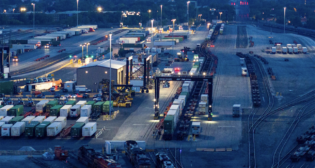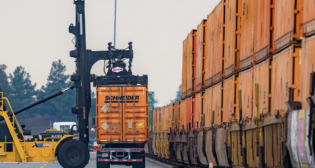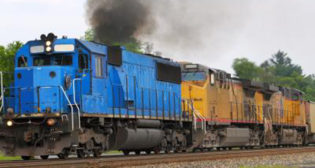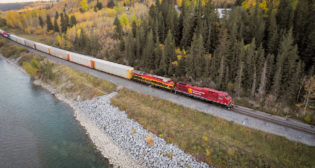
Cowen Touts Class I “Resiliency”
Written by Andrew CorselliCowen and Company revealed its rail-earnings takeaways, which saw the rails tout pricing despite weak volumes in 4Q. However, Cowen said it believes “that the effects of the Coronavirus on supply chains are not fully appreciated, with contacts telling us that Asian ports are at 40-50% operational capacity—railroad most at risk is Union Pacific. CN's network is nearly shut down because of pipeline protesters and could lag the group near-term. We continue to favor Kansas City Southern among the rails.”
Cowen analysts Jason H. Seidl (Managing Director and Railway Age Wall Street Contributing Editor), Matt Elkott and Adam Kramer went on to note that Class I’s showed “resiliency.”
“They managed to report results from a quarter where volumes declined about 7.5% year-over-year and walk away unscathed,” the analysts said. “Sure, earnings fell for some carriers, but the market reaction has been resoundingly positive with the rail group up roughly 7.5% year-to-date vs. the broader market average of about 4.5%. PSR was a big focus with every railroad crediting it for helping their operating statistics and earnings in the quarter. It is hard, however, to accurately assess just how much PSR really did for operations at some carriers given the notable fall in traffic. Indeed, if your volumes are down 7%, you better have improved operating statistics. As we move throughout the year rails will have their operations tested as freight comes back.”
Pricing continues to be discussed on all earnings calls but less directly than in the past as all railroads have ceased giving investors insights to pure pricing increases/decreases, the analysts said. Despite the reduced visibility, all rails reported that pricing was inline with their expectations and remained above their rail cost inflation, they added. “This was essentially relayed to us by shippers in our most recent proprietary 4Q Rail Shipper Survey where shippers indicated that pricing was expected to be 3% or sequentially flat from the 3Q survey results. With that said, we have been hearing from some contacts that railroads are selectively willing to trade some price for volume. This is not overly concerning or surprising given the volume weakness, but we will keep a close eye on it just in case it their selectivity spreads.”
Feeling Coronavirus Effects
While the Coronavirus has garnered headlines in the global press, transportation companies have been largely quiet about its potential impacts, the analysts revealed. “Some company management teams indicated that they have not heard about any impacts yet and this may have been the case during the earnings reporting period. Since that time, it has become apparent that global supply chains are going to suffer in 1Q. Many factories remain shut or partially staffed and some industries (such as the automotive industry) are already facing a parts shortage. Couple this fact with a massive slowdown at the ports (some contacts are telling us Asian ports are at 40-50% operational capacity) and you are likely to be a bit worried about 1Q20 transport results. We would be worried about companies that are more exposed to trade with Asia such as UP in the rail space and EXPD (Expediters International) Logistics Solutions in the logistics space.
“Almost all the railroads indicated that their baseline assumptions include a truck market that sees tighter capacity in the back half of the year along with higher trucking prices. This is fairly consensus and inline with our views now as we believe continued bankruptcies will accelerate as insurance renewals lap and the increasing impact of the new drug and alcohol database take hold. This should enable the railroads to win back some of the freight they lost to the highways (especially if they keep improving their service levels) and raise pricing a bit in the back half of the year.”
CN’s Blockades
Post earnings, CN has been dealing with a First Nation’s blockade of its western lines. Initially the blockades were set up near Belleville, Ontario, and New Hazelton, B.C. However, the other day a third blockade was set up near Winnipeg. The initial blockades were bad enough with the railroad commenting that 150 freight trains and 157 passenger trains had been halted. “Winnipeg, however, is different in that it is CN’s key link to Western Canada and to the U.S.,” the analysts said. “This all of course comes after the Canadian government set up speed restrictions for hazardous material trains due to a recent derailment on the CP. These events have gone on for over a week and during this time the railroad is incurring costs and not booking revenue. Although it’s too early to put an estimate on the impact, it appears to be shaping up to be a tough quarter for the railroad.”
Top Rail Pick
“Thus far investors appear to be willing to look past a difficult 1H20,” the analysts concluded. “This may change if companies push out the proverbial goal posts for growth to 2021. Nevertheless, we remain confident that our top rail pick, KCS, will continue to outshine the others as it benefits from supply chain shifts to Mexico and Central America and the pending ratification of the USMCA. To date in 2020, KCS’s total volumes are +6.0% compared to the total North American Class I rail system at -4.5%, with operational numbers that are vastly improved yearly as well.”



